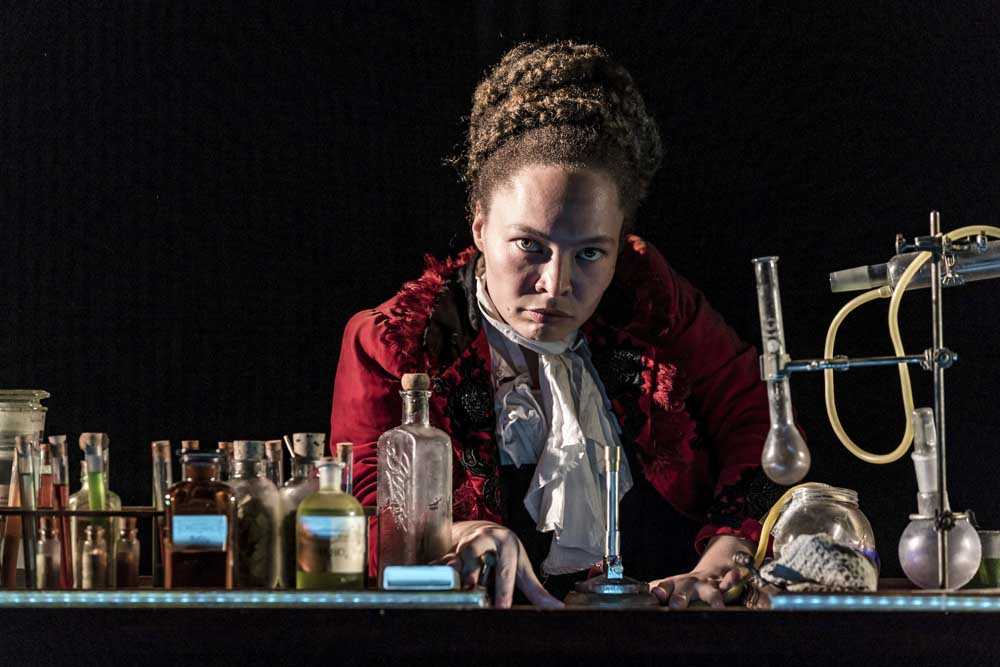Evan Placey’s adaptation of Jekyll and Hyde, produced by National Theatre is currently touring secondary schools. Susan Elkin caught up with the playwright.
Evan Placey and I have history. I last interviewed him for Ink Pellet six years ago in a chain coffee shop in Catford. Just for old times’ sake we’ve met in the same venue today. And of course, a lot of water has flowed under both our bridges since 2016.
“regardless of how… the school is set up for drama, the experience should feel like going to the theatre”
Take Jekyll and Hyde a version of which was commissioned from Evan by National Youth Theatre for its Rep Company in 2017. I saw and reviewed the production then and remember it as a topical, intelligent, thoughtful reworking of Stevenson’s novella rather than a conventional adaptation. Harriet Jekyll is Dr Jekyll’s widow trying to carry on his work, which results in her developing an alter ego as a violent, forthright prostitute and there’s a subplot about a senior judge and a rent boy. Meanwhile, in another world, a young 21st century blogger is using the story of Harriet Jekyll to kick against the extant patriarchal traces. I said at the time that I was sure the play would have a life beyond its debut production and now it has been taken up by National Theatre for its spring tour to secondary schools.
“Of course, we’ve had to make some changes” Evan tells me. “It was written as an ensemble piece for a cast of about 16, but now we have a cast of eight. I’ve also had to streamline it in order to reduce the running time to fit the school day.”
How does the set work when it has to be erected in a different school every day? “Well, regardless of how well (or not) the school is set up for drama, the experience should feel like going to the theatre” says Evan. “The set design is actually very clever using easily mobile panels effectively” says Evan, adding that rehearsals have been tricky because of Covid and that NT prudently has two swings on call in case a cast member goes down.
The host schools operate in partnership clusters. One school in each city acts as a hub and gathers a group of local schools around it. So, typically, there are groups from several schools at each performance. “Overall, the tour is scheduled to reach over ten thousand young people, many of whom have never seen live theatre before” says Evan, telling me that there’s a Q&A session after each performance.
Evan is very busy with other projects too. His play Wild! for age 8-11 is produced by Tutti Fruiti in Leeds and is now playing in France and Germany. “It’s about a boy with ADHD” Evan informs me. There is also a revival of Evan’s 2019 play, Mother of Him coming to Park Theatre soon. “I’ve just finished a commission for a family show for National Theatre, but NT always over commissions – that’s how it works – and it may not be produced. But if it doesn’t make the grade, I shall be free to take it somewhere else.” Also in the pipeline is a noir TV show for Sky about which Evan isn’t yet free to talk. There seems to be a lot going on. “I have to split my time between a range of concurrent projects” in order to pay the bills, says Evan pragmatically. “Doing one thing at a time is just not practicable.”
Evan and his partner have an adopted son, aged 7, about whom Evan talks a lot, and I know that our time is constrained because he has to meet the boy from school. I ask him whether his son is old enough yet to appreciate his father’s plays. “He’s just starting” says Evan with a grin. “He liked my show Keepy Uppy which is a football story for age 3-5 year olds.”
When I first met Evan, he had recently written a play for Synergy a company run by Esther Baker for prisoners and ex-prisoners. “Yes, that work goes on he says – and Esther’s an adoptive parent too so we have a lot in common. We’re working up a piece relating to ageing prisoners at the moment. There are huge problems because many of them are ill, officers become carers and there must be what are effectively hospices within prisons.”
And, busy as he is, Evan is also chair of Bromley Fostering Panel as well as sitting on adoption panels. “I feel that I’ve learned a lot about the care programme and how it works and affects the children within it. So I want to help create something positive” he says. And with that he races off to catch the bus to his son’s school.



